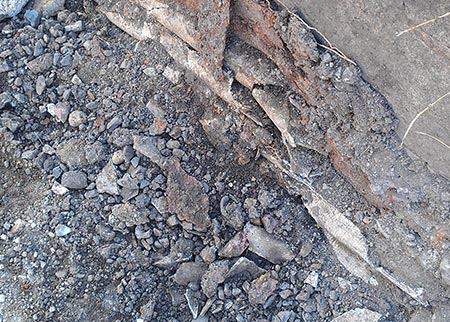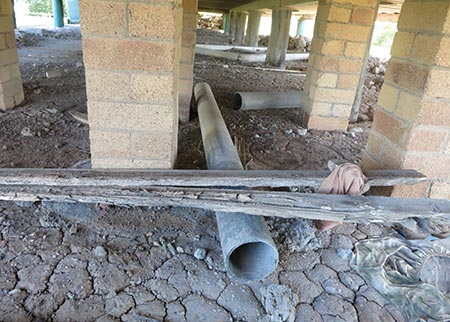
Asbestos in Soil
Most people have some level of awareness about asbestos in either the home or the workplace, but are you aware that asbestos in or on soil can also be a significant issue which can affect anyone who engages in any activity that disturbs the soil?
This could be a homeowner who wants to extend or raise their home, a landscape gardener or a developer or builder. Asbestos was extensively used in a wide range of building materials and other products up to the mid 1980s. A number of factors including poor regulation, wilful ignorance and a lack of awareness of the health risks about asbestos at the time has led to a surprisingly large amount of asbestos containing material (ACM) being present both on and within the soil. The location of asbestos in soil is not limited to urban areas; in fact it was a common practice to use free fill (soil and building material) for a wide range of uses including but not limited to, landscaping, erosion control and soil fill in both urban developments and rural areas.

Buried asbestos under retaining wall

Disused asbestos pipe under building
The result of this previous mismanagement means that there is no guarantee that the soil on a property you may already own or be interested in purchasing would be free of asbestos. Asbestos is a soil contaminant that differs from most others, in that its toxicology primarily affects humans rather than being a risk to the environment. Inhalation of asbestos fibres can produce a range of lung associated diseases including cancers, sometimes from low levels of exposure.
What You Need to Know
Envirohealth Consulting has extensive experience in the identification and management of asbestos both on and in the soil. Asbestos materials are commonly identified as either bonded or friable material. The word ‘bonded’ refers to a product where the asbestos fibres are firmly bound within the matrix of the product, for example fibre cement sheet or “fibro”. Friable refers to a material that can be crumbled by hand with asbestos fibres easily released. However after a period of time buried in soil even a bonded asbestos material can be weathered by the moisture within the soil to a point that the matrix material breaks down and it becomes friable. This means that disturbance of the soil by even minor means such as a shovel may result in the release of asbestos fibres depending on the type and condition of the material.
The discovery of asbestos in or on the soil can result in both significant costs and significant time delays to any project that involves earthworks. Soil that contains asbestos cannot be freely disposed of and must be managed as a hazardous waste material; this affects how the soil is removed, transported and disposed of. Also it is very important to be aware of the existence of asbestos within soil, as being ignorant of asbestos may result in localised asbestos material being spread over a larger area on a site or contaminating another area.
Envirohealth Consulting can provide a range of services regarding asbestos in soil. These include the following:
- Conducting a preliminary site investigation which involves an investigation of records and anecdotal material as well as a site walkover to look for signs of contamination.
- Conducting a detailed site investigation.
- Compiling asbestos management plans. Envirohealth Consulting recommends remediation options that minimise public risk and soil disturbance as well as the amount of contaminated material that is removed to landfill.
- Envirohealth Consulting is a National Association of Testing Authorised (NATA) accredited laboratory, based in both Brisbane and Townsville, and are accredited for the analysis of asbestos in soil.
Checking Asbestos and Managing Asbestos
A preliminary Site Investigation (PSI) is a crucial first step when examining a site that has planned earthworks. The effectiveness of the PSI is critical to the subsequent management of the site, as any asbestos contamination that is missed can then be accidentally further spread across the site during the earthworks. This can result in a much larger area of ground requiring investigation and remediation. This can be a both costly and protracted exercise. Depending on the findings of the PSI a detailed site investigation may be required.
Once asbestos in soil is discovered, an Asbestos Management Plan must be developed for the site. Envirohealth Consulting has extensive experience developing management strategies dependent on the amount of asbestos detected and the proposed site use. This can include determining if the asbestos is confined to purely surface ACM which is a simple surface impact, or whether it is located at depth. This determination can then be used to prepare remediation options or alternatively, if appropriate, develop options for the in situ management of the asbestos. Envirohealth Consulting, where possible, prefers to recommend options that minimise public risk and soil disturbance as well as the amount of contaminated material that is removed to landfill.
Being a NATA accredited laboratory with highly experienced staff, Envirohealth Consulting can conduct asbestos in soil concentration analysis; this is particularly important as different levels of contamination can determine what management options are available based on the nominated land use of the site in question. This can result in a management strategy that minimises both costs and time delays which is critical to the successful completion of any construction or development project no matter how large or small.
So before you break dirt contact Envirohealth Consulting and talk with our experienced soil management team.
![]()
HEAD OFFICE: Unit 7/210 Queensport Rd North, Murarrie QLD 4172
PHONE: (07) 3390 5344 | FAX: (07) 3390 6244 | EMAIL: info@envirohealth.com.au
TOWNSVILLE OFFICE: Unit 4, 42 Ross River Road, Mundingburra Qld 4812
PHONE: (07) 4755 0054 | FAX: (07) 4725 7160


